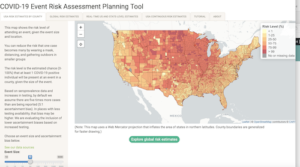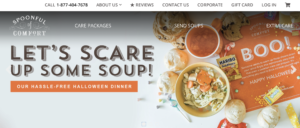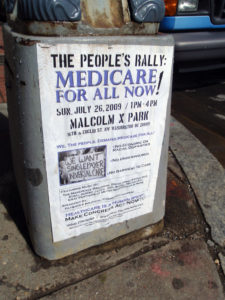Mondays with Mike: Don’t be a turkey
November 16, 2020 • 4 Comments • Posted in Mike Knezovich, Mondays with MikeIf you’ve had a personal experience with COVID, it changes how you view it. Having had a very personal experience with it back in March, it’s been maddening and infuriating to watch our country go without a national policy, and to watch so many of my fellow citizens behave in selfish and reckless ways.
As a consequence, it’s sadly very clear that if you don’t personally know someone who’s had it, you will. And sooner, rather than later. And that first friend or family member will be at the top of a growing list. I’d lay money on it.

Planning a Thanksgiving get-together? Use this nifty tool from Georgia Tech. Click the number attending then hover over your town or county. And afterward, maybe thing again.
We know a fair number of people who have tested positive and many have fallen seriously ill. In the beginning, we chalked it up to city life and a dense population. I’d been going to the office as usual before contracting it, often taking the subway. My daily life simply made me more vulnerable.
But we’re clearly in a new stage. The rest of the country, rural or not, is catching up. And it terrifies me. Our list of friends who’ve had it increased by two last week, one of them from the Chicago suburbs, the other downstate. They’re both health care workers who have been meticulous in their anti-COVID protocols and have escaped until now.
In one case it infected our friend and her colleagues in her clinic, leaving their department strained. The outbreak was traced to an intern who’d done a shift, and who, for some insane reason, had attended an in-person training. Apparently, a good many of the participants had also tested positive.
Our other friend has been on the front lines for a major regional medical provider. That’s including administering COVID tests, and tending to sick COVID kids who’d contracted it on spring break. She’d sort of assumed it was inevitable, and even took a B&B to avoid bringing it home to her family. She miraculously avoided contracting it—until a week or so ago. She got pretty sick but the virus has cleared and the worst symptoms have subsided—except for the smothering, lingering fatigue. It’s like nothing else I’ve ever experienced. It was a slog just getting out of bed every morning. I’d wake up, have a coffee, feel pretty good and work at my computer and then…90 minutes later BAM! Napping wasn’t a luxury, it was mandated by my body. And then, it was murder getting out of bed again, and repeat.

Don’t let uninvited guests join your Thanksgiving.
Our doctor friend is experiencing that now. But she has to go back to work tomorrow. Because the provider she works for is down 200 staff to COVID right now.
And it’s going to get worse. How much worse depends on us. As I wrote in an earlier post, “Let’s take care of the people who take care of us.”
We’ve been using a little app called Marco Polo to send video messages back and forth with distant friends for the past few weeks. One of them told us that she was agonizing about whether or not to go home for Thanksgiving for a planned gathering. Her sister was adamant that they both should stay away. And she issued a pretty effective warning she’d heard:
Don’t let your Thanksgiving celebration cause Christmas funerals.
PS: It’s not the flu. Just ask Chicago Tribune columnist Heidi Stevens.
PS #2: It’s not the flu. Just ask R&B performer Jeremih.


